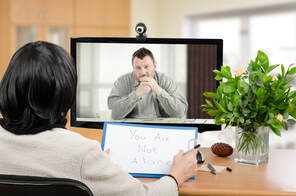 By Sarah Trance, LMFT If you’re a therapist or mental health counselor, you’ve likely been thrusted into virtual sessions during COVID-19 and I know it's not ideal. I think we can all agree that face-to-face sessions feel better to us; our norm in many ways, and during time of crisis and chaos, it makes sense to crave your normal. But, we’re in a time where it’s vital to focus on the silver linings! I'm learning that there can be some great aspects to telehealth including our ability to have access and give care to our clients, continuously. So, how do we make this work?! I've compiled some tips over the last few weeks based on my own experiences, feedback from colleagues and open dialogue with clients on how to transition to or begin virtual sessions:
situations. This isn't going to be possible for all clients so how can you process with them what will and will not work? -Be straightforward in what you're hoping for, set your boundaries but be willing to be flexible – it’s needed right now! -Make note of something that feels like a ‘clinical issue’ versus ‘necessary’ during this time (re: what does it mean if the client is eating during session or are chatting from their bed?
disconnected, and you need to reset. Discuss this in advance with your client so you can all feel prepared. -Make a plan with the client. Expect for glitches! When do you roll with it and when do you need to reset your app, internet or switch to another mode (phone, Facetime or another HIPAA compliant app)?
sessions or taking notes to stay engaged
“You are not working from home; you are at work during a crisis trying to work” -- Unknown Check out these resources for more information and support: Transitioning to Telehealth Resource via AAMFT: Here is a free e-course -- https://www.brightervision.com/transitioning-to-telehealth-aamft// Working Remotely During the Pandemic: Boundaries Matter – A blog from AAMFT. Support for the Therapist: Who Prepared Us for a Pandemic – A blog from AAMFT Best Teletherapy Platforms: Pricing, Features and Rating Comparisons – A blog from Zencare Headspace – Free for healthcare workers with NPI The Gift of Therapy by Irvin Yalom -- Book for therapist Comments are closed.
|
Categories
All
Archives
March 2023
|
[email protected]

 RSS Feed
RSS Feed